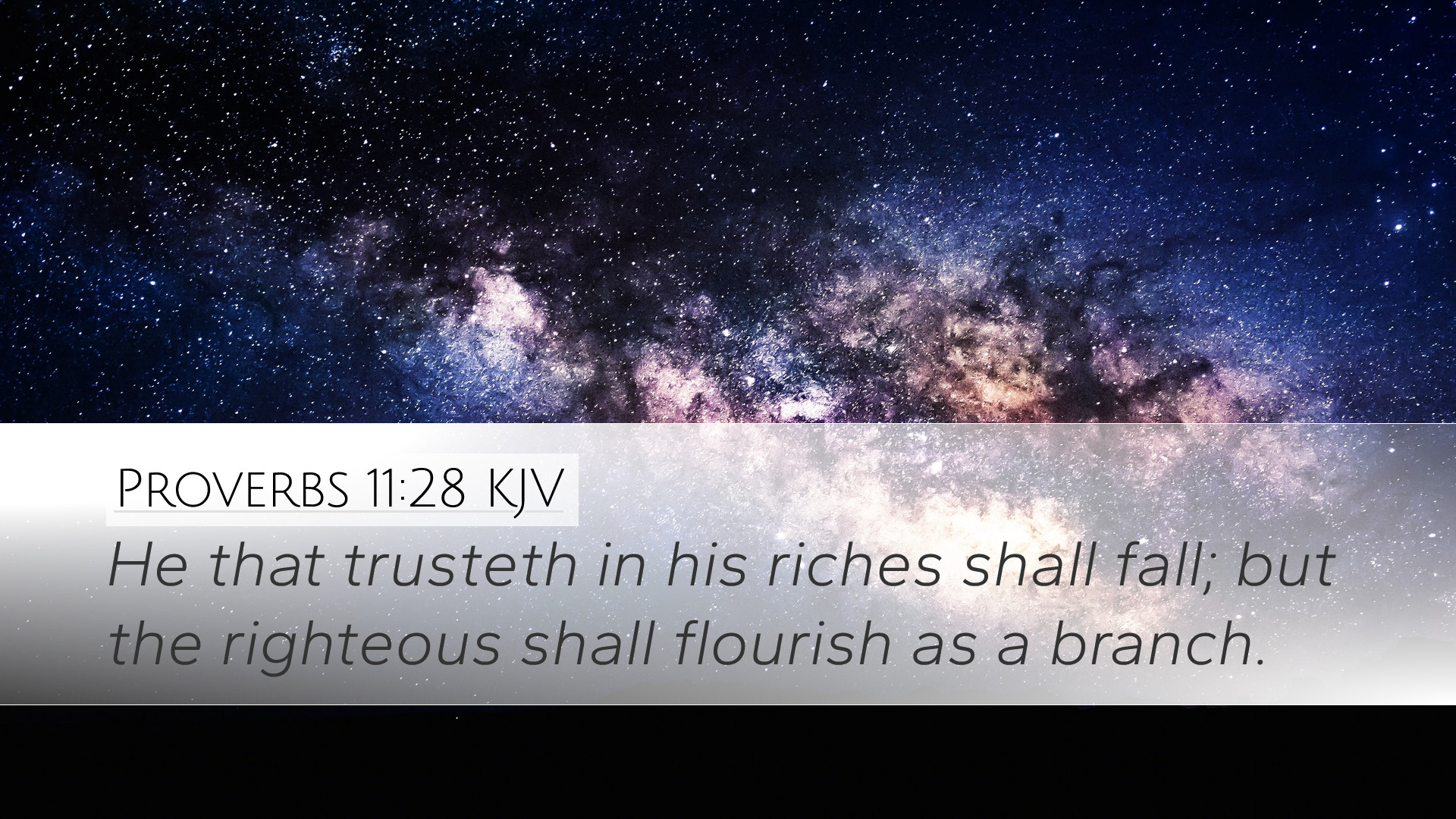Commentary on Proverbs 11:28
Verse: "He who trusts in his riches will fall, but the righteous will flourish like the green leaf."
Introduction
This verse from Proverbs succinctly contrasts the fate of the wealthy who place their trust in material riches with that of the righteous. Riches can create a false sense of security, leading individuals astray from reliance on God. In this commentary, insights from Matthew Henry, Albert Barnes, and Adam Clarke will be synthesized to unpack the profound meaning of this verse.
Analysis of Riches
Matthew Henry emphasizes that riches are often a deceptive force. He notes that people who trust in their wealth may experience a temporary rise in status and comfort, but ultimately, this reliance leads to a downfall. He mentions that wealth can be like a water, which nourishes but can also drown if one is not cautious. Riches should be viewed as a tool for service, not an object of trust.
Albert Barnes elaborates on the precarious nature of wealth. He indicates that trust in riches can lead to spiritual apathy and moral compromise. In his view, such a trust reflects an unawareness of the fleeting nature of material possessions and a neglect of spiritual obligations. Barnes warns that the ultimate demise of those who place their faith in wealth is not just physical, but spiritual as well.
Adam Clarke adds another dimension, discussing the societal impacts of wealth. He posits that individuals who become overly reliant on their riches may also suppress the needs of others. Clarke highlights that wealth often leads to arrogance and a lack of empathy, which can contribute to societal injustice.
The Righteous and Their Flourishing
The latter part of the verse presents a striking contrast to the fate of the wealthy. The righteous are depicted as flourishing “like the green leaf,” which is a metaphor rich with meaning. It implies vitality, health, and continuous growth.
Henry sees this flourishing as a result of divine favor. He argues that the righteousness of an individual leads to blessings that are far more substantial and lasting than material wealth. This flourishing is both emotional and spiritual, leading to a life marked by joy and peace.
Barnes expands on this idea by connecting the flourishing of the righteous to their dependence on God. He argues that a life of righteousness brings its own rewards, which can be seen in a person's character, integrity, and relationships. The metaphor of the green leaf signifies that genuine success and endurance stem from living in accordance with God's laws.
Clarke emphasizes that the flourishing of the righteous is not solely for their benefit. Instead, it serves a greater purpose in bringing about positive influences in society. Righteous individuals are likened to trees, providing shade and nourishment to others, symbolizing the interconnectedness of all living beings.
Theological Implications
This juxtaposition in Proverbs 11:28 invites deeper theological contemplation. It confronts the idolatry of wealth and stands as a reminder of the ultimate source of security—faith in God.
- Idolatry of Wealth: Trusting in material wealth can lead to spiritual blindness. Those who are wealthy may not perceive their need for God, while the righteous acknowledge their dependence on Him.
- Spiritual Flourishing: The term “flourish” implies growth but also indicates resilience. The righteous will thrive despite external circumstances, as their foundation lies in God.
- Community Impact: The righteousness of believers serves as a testimony to society, fostering an environment of support, compassion, and justice. Their flourishing leads to collective well-being.
Practical Applications
For pastors, students, and scholars, Proverbs 11:28 offers practical guidelines for living a life of balance and intention in how one approaches wealth and righteousness.
- Self-Examination: Measure your trust not by your financial status but by your reliance on God in all circumstances.
- Community Engagement: Use your resources to uplift and support those around you, showcasing the love of Christ through action.
- Teaching Righteousness: Encourage others to live righteously, highlighting the blessings that come from a life dedicated to God.
- Prayer for Wisdom: Regularly seek divine guidance in all financial matters to ensure that your dealings honor God and align with His will.
Conclusion
Proverbs 11:28 presents a powerful dichotomy between the fleeting nature of trust in wealth and the flourishing life of the righteous. Relying on God leads to true prosperity that transcends material conditions. As we reflect on this verse and its implications, may we aspire to live in righteousness, trusting in the eternal rather than the temporary.


